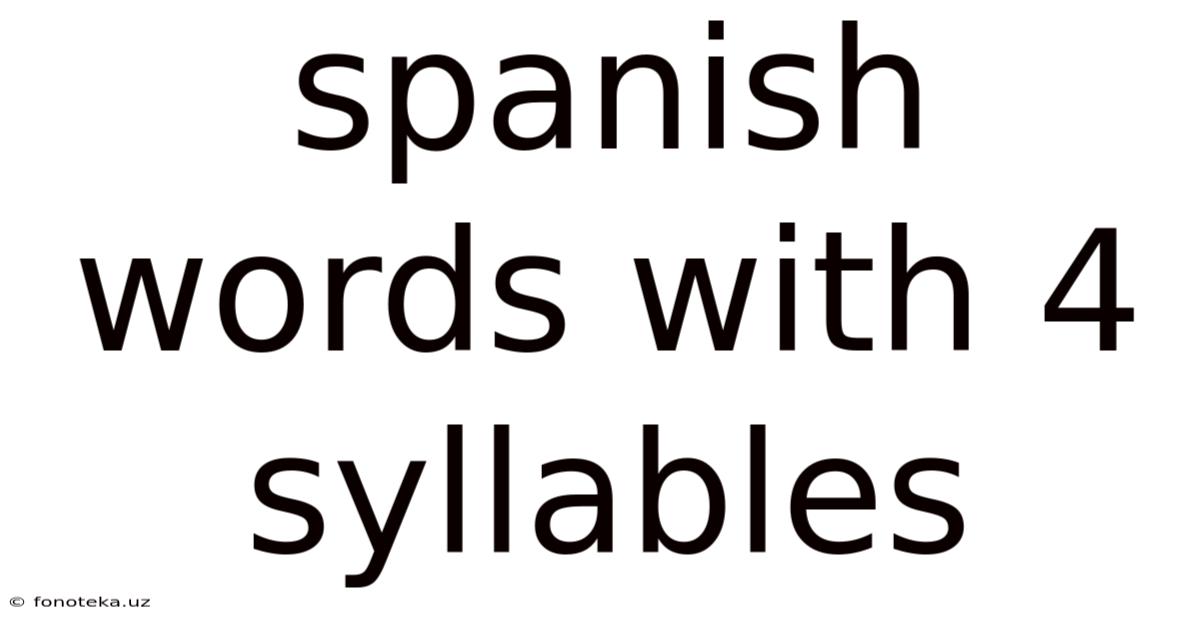Spanish Words With 4 Syllables
fonoteka
Sep 22, 2025 · 5 min read

Table of Contents
Delving into the Depths: Spanish Words with Four Syllables
Spanish, a vibrant and melodic language, boasts a rich vocabulary. While shorter words are common, the language also features a significant number of polysyllabic words, adding depth and complexity to its expression. This article delves into the fascinating world of four-syllable Spanish words, exploring their structure, common patterns, and providing a comprehensive list of examples categorized for easier understanding. Learning these words enhances not only your vocabulary but also your comprehension of Spanish sentence structure and rhythm.
Understanding Syllable Structure in Spanish
Before we dive into the four-syllable words themselves, let's briefly review Spanish syllable structure. Spanish syllables are generally straightforward. They typically follow the pattern of consonant-vowel (CV) or vowel-consonant (VC). A syllable must contain a vowel. Understanding this basic structure helps in identifying and breaking down longer words like those with four syllables. Words with four syllables often involve a combination of these basic patterns, sometimes incorporating consonant clusters.
Common Patterns in Four-Syllable Words
Four-syllable Spanish words often exhibit certain patterns. These patterns can involve the repetition of sounds, specific suffix additions, or the combination of root words and prefixes/suffixes. Common patterns include:
- Prefix + root + suffix: Many four-syllable words are created by adding prefixes (like des- or in- ) and suffixes (like -mente or -ación) to a root word. This process significantly expands the vocabulary.
- Compound words: Some four-syllable words are formed by combining two shorter words, resulting in a word with a new meaning.
- Words with multiple suffixes: Adding multiple suffixes to a root word can also lead to four-syllable constructions.
Categorizing Four-Syllable Words
To make this exploration more manageable, we'll categorize the four-syllable words into different semantic fields. This will help illustrate how these words function within different contexts.
1. Abstract Nouns
Abstract nouns often describe concepts or qualities. Four-syllable examples include:
- independencia: independence
- caracteristi*cas: characteristics
- administración: administration
- oportunidad: opportunity
- socieda*des: societies (plural)
- dificultades: difficulties (plural)
- relacio*nes: relationships (plural)
- responsabili*dad: responsibility
- competi*ción: competition
- experimenta*ción: experimentation
2. Concrete Nouns
Concrete nouns represent tangible things. Four-syllable examples in this category are:
- capitulación: capitulation
- revolu*ción: revolution
- organización: organization
- investigación: investigation
- manifestación: manifestation
- interpretación: interpretation
- administrador: administrator
- profesor: professor (Though sometimes pronounced with 3 syllables depending on accent)
- comunicación: communication
- informa*ción: information
3. Verbs
Verbs, the action words, also appear in four-syllable forms:
- desarro*llar: to develop
- caracterizar: to characterize
- adminis*trar: to administer
- interpre*tar: to interpret
- comuni*car: to communicate
- organi*zar: to organize
- investi*gar: to investigate
- definir: to define
- califi*car: to qualify
- represen*tar: to represent
4. Adjectives
Adjectives describe nouns, often adding detail and specificity. Some four-syllable adjectives include:
- independiente: independent
- característi*co: characteristic
- administrati*vo: administrative
- revoluciona*rio: revolutionary
- específico: specific
- genera*lizado: generalized
- importan*te: important (Though commonly pronounced with 3 syllables)
- interesan*te: interesting (Though commonly pronounced with 3 syllables)
- dificultoso: difficult
- complejo: complex (Sometimes pronounced with 3 syllables)
5. Adverbs
Adverbs modify verbs, adjectives, or other adverbs. Four-syllable adverbs are less common but exist:
- independientemente: independently
- característicamen*te: characteristically
- administrativamen*te: administratively
- específicamente: specifically
- generalmen*te: generally
- intensamente: intensely
- efectivamen*te: effectively
- interesantemen*te: interestingly
- similarmente: similarly
- dificilmente: with difficulty
Expanding Your Vocabulary: Tips and Exercises
Mastering four-syllable words takes practice. Here are some helpful tips and exercises:
- Contextual Learning: Don't just memorize word lists. Encounter these words within sentences and paragraphs to understand their usage and meaning. Read Spanish novels, articles, and watch Spanish-language films and TV shows.
- Flashcards: Create flashcards with the word on one side and its definition and a sample sentence on the other. Regularly review your flashcards.
- Sentence Creation: Once you learn a new word, try creating your own sentences using it. This helps solidify your understanding and reinforces its meaning.
- Pronunciation Practice: Pay close attention to the pronunciation of these words. Break them down into syllables to ensure you pronounce each part correctly. Use online resources or language learning apps to practice pronunciation.
- Focus on Roots and Affixes: Understanding common roots and affixes will help you decipher the meaning of new words more easily. Learning the meaning of prefixes and suffixes will significantly expand your vocabulary comprehension.
Frequently Asked Questions (FAQ)
- Are four-syllable words common in everyday Spanish conversation? While not as frequent as shorter words, four-syllable words appear regularly in more formal settings, written texts, and when discussing complex topics.
- How can I improve my pronunciation of four-syllable words? Practice breaking the words down into syllables and paying attention to the stress patterns. Listen to native speakers pronounce these words and try to imitate them.
- Are there resources available to help me learn four-syllable words? Many online dictionaries and vocabulary-building resources include these words. Language learning apps often incorporate exercises that focus on vocabulary expansion.
Conclusion
Mastering four-syllable words significantly enhances your Spanish proficiency. It demonstrates a deeper understanding of the language's structure and allows for more nuanced and sophisticated expression. By understanding the common patterns, actively practicing with different word categories, and utilizing helpful learning strategies, you can confidently incorporate these words into your Spanish vocabulary. Remember, consistent effort and engagement are key to achieving fluency and a rich understanding of the Spanish language. Embrace the challenge, and enjoy the journey of expanding your lexical horizons!
Latest Posts
Related Post
Thank you for visiting our website which covers about Spanish Words With 4 Syllables . We hope the information provided has been useful to you. Feel free to contact us if you have any questions or need further assistance. See you next time and don't miss to bookmark.